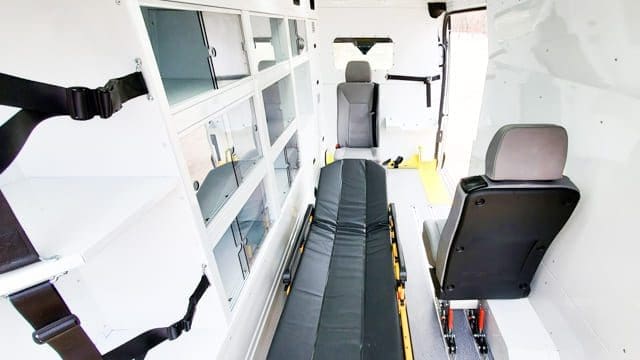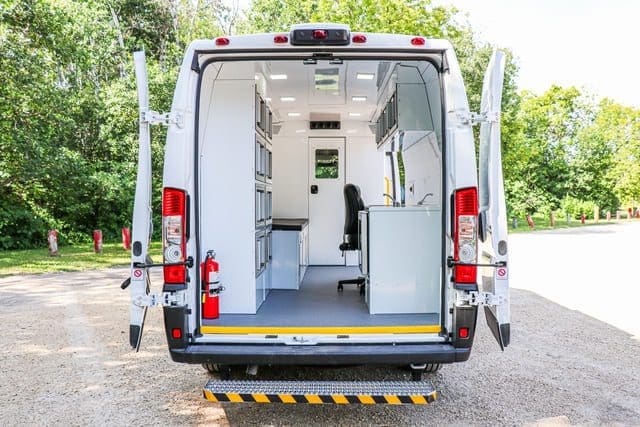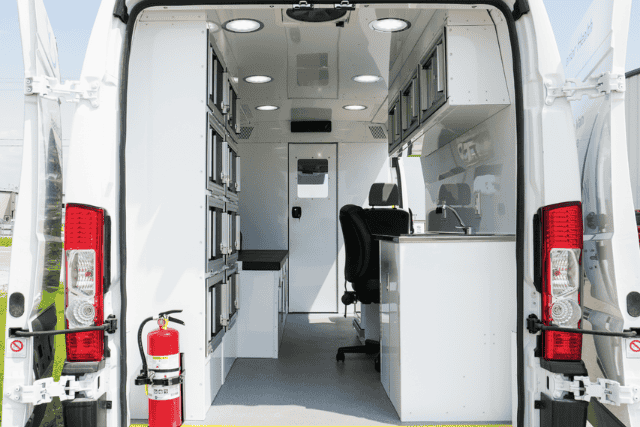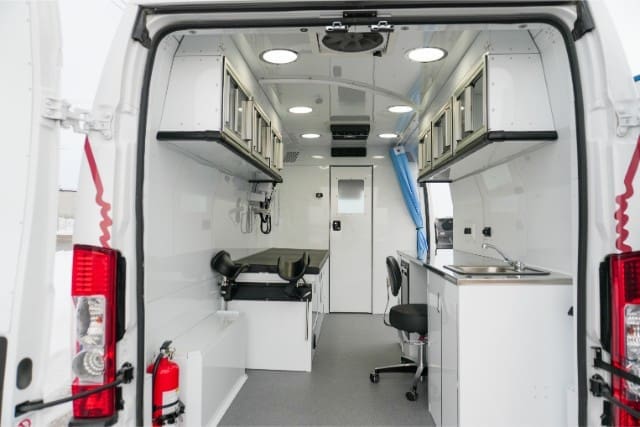Reliable stretcher transport ensures safe and comfortable transfers for patients. It also encourages dignity and respect and contributes to an inclusive healthcare system. Without stretcher transport, patients will experience delays in reaching the hospital. They’ll be prone to safety risks that can lead to discomfort and injuries, which will also strain caregivers.
Imagine a senior named John who just fell down the stairs and severely strained his back. He managed to reach for his phone to call his son to take him to the hospital in his car, but the cramped vehicle made the back pain excruciating. They Googled ‘stretcher transportation services near me’ and managed to get John safely in a stretcher transport van and off to the hospital.
Our team at AVAN Mobility doesn’t like seeing barriers that prevent people from getting healthcare. For 10+ years, we’ve been manufacturing mobile medical vans for organizations all over North America. One of the vans we make can be used for stretcher transport.
In this article, you’re going to learn more about stretcher transport and how it works. We’ll also talk a bit about the stretcher transport van that we manufacture. This van is also commonly referred to as the Mobile NEMT Van and/or Mobile Response Van.
What is stretcher transport?
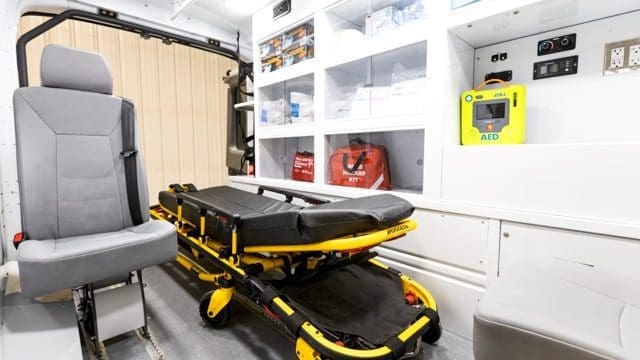
Stretcher transport is a way of helping people who can’t move easily on their own because of illness, injury, or disability. Think of it like a comfortable and secure platform that’s specifically designed to carry someone from one place to another safely.
Stretcher transportation services are a bridge for those who need to:
- Go to important medical appointments
- Return home from the hospital
- Travel long distances without the stress and discomfort of sitting up when they’re not able to
- Get to the ER safely
Let’s take a look at another example of Nadine, an 85-year-old grandmother with a big, loving family. She’s been in the hospital for a while, getting treatment for a broken hip. Nadine is getting better, but she’s not yet strong enough to walk or sit up for a long car ride.
Her granddaughter’s wedding is coming up, a moment Nadine has dreamed of witnessing for years. Thanks to stretcher transport, Nadine doesn’t have to miss this precious family moment. A stretcher transportation van, equipped with all the necessary medical equipment and a team of caring professionals, can bring Nadine safely to the wedding and back.
She gets to see her granddaughter say “I do,” surrounded by love and family, without compromising her health and comfort.
The impact of stretcher transportation on EMS/ambulance services
The nice thing about stretcher transport services is that they free up EMS and ambulance services, making them more available for urgent emergencies. Ambulances need to be ready for the most critical situations, like accidents or severe illnesses.
Now, if we go back to the example above, Nadine does need to get to her granddaughter’s wedding, but it isn’t an emergency. That’s where stretcher transportation comes in. It means ambulances can respond to emergencies and help people in life-threatening situations.
This service is a lifeline that connects people to important life events, medical care, and even the warmth of family gatherings. It ensures no one is left behind because of mobility challenges. It embodies the commitment of many organizations to remove barriers and make healthcare and transportation accessible for everyone.
In the next section, you’ll learn a bit more about how stretcher transport works.
How does stretcher transport work?
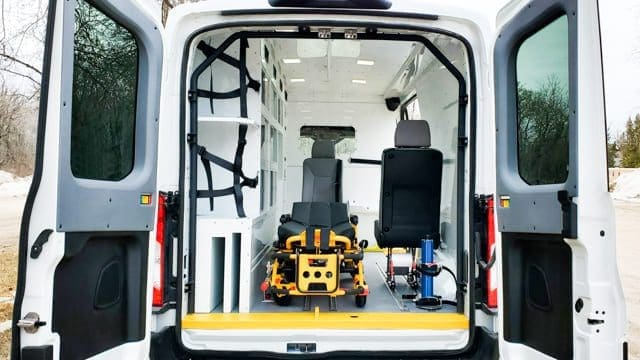
Stretcher transport is a service tailored for individuals with unique medical needs. Here’s a brief breakdown of how it works:
- Specially designed stretcher: Stretcher transport begins with a special platform bed that includes a sturdy frame. This isn’t your regular bed; it’s crafted for safety, comfort, and support during transit. Individuals can lie down securely and enjoy a smooth journey.
- Skilled professionals ensure safety: Highly trained medical professionals are part of stretcher transport. Their expertise involves securely placing the stretcher within the transport vehicle. It’s all about prioritizing passenger safety and comfort every step of the way.
- Purpose-built vehicles: Stretcher transport vehicles are designed with a specific purpose. They come equipped with fastening systems and have streamlined loading and unloading processes. This purposeful design ensures efficiency and safety.
- Health-centric environments: Beyond being a mode of transportation, stretcher transport focuses on creating a health-centric environment. The interiors of the vehicles are carefully designed to cater to various health challenges. They provide a controlled and comfortable space for passengers.
- Adherence to regulations: For businesses, it’s important to choose stretcher transport manufacturers that comply with health and safety regulations. This will make sure your clients feel confident in your services.
Which stretcher transport vehicle should you choose?
When you need the best van for stretcher transportation, the Mobile Response Van/Non-emergency Medical Transport (NEMT) van is your top pick. This van is built on the Ram ProMaster 2500 model, which is big and sturdy. Let’s talk about why it’s so good for stretcher transport.
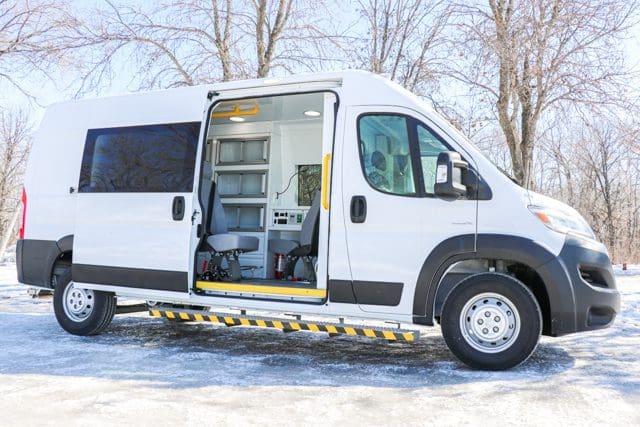
Spacious: This van has lots of room, just like an ambulance, but for patients who don’t need emergency help right away. It has plenty of space for a big stretcher and for people to sit comfortably.
Easy to get in and out: The back doors of the van open wide, so you can move stretchers in and out smoothly without any trouble.
Robust cabinets: It has durable aluminum cabinets that slide open. You can grab what you need quickly, and their wipe-clean surfaces make them simple to keep clean.
Areas for equipment: Everything has its own place in stretcher transport vans. First aid kits and oxygen bottle holders that hold the oxygen tanks are securely stored. This means your team can find things quickly and conveniently.
Stretcher stays put: The floor has a special system that lets you lock the stretcher in place. This keeps the patient safe and still while you drive.
Flexible seating arrangements: With AutoFloor, you can move seats around for the people helping out in the van, making more room or bringing them closer to the patient. AutoFloor is a seating system that lets you easily configure seating arrangements and layouts in the van.
Stay cool or warm: With heating and air conditioning in the back, everyone stays comfortable, no matter what the weather is like outside.
Quiet and private: A divider between the driver and the back keeps things quiet for the patient, giving them some privacy.
Power: There are plugs and switches to power up medical gear. This means you can take care of patients on the go.
Illuminated interior for better visibility: With strategically placed lighting, the van ensures a well-lit environment that enhances visibility and safety during stretcher transport in varying conditions.
Another solution for stretcher transportation: The P4 3-in-1
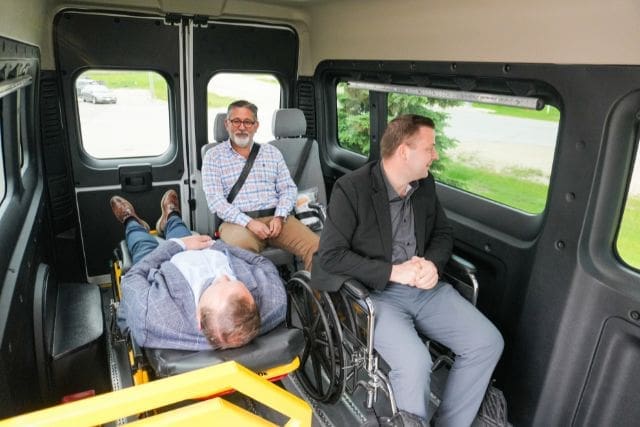
If versatility and efficiency are your top priorities, the P4 3-in-1 van is another excellent choice for stretcher transportation. This vehicle combines the ability to handle stretcher transport and ambulatory seating, making it an all-in-one solution for various medical transport needs. Here’s why the P4 3-in-1 stands out:
No additional driver licensing required: Operate this vehicle without needing specialized licensing, simplifying your team’s training process.
Ambulatory access: This van ensures easy access for all patients, accommodating various transportation requirements seamlessly.
Small footprint for city driving: Maneuver through urban environments effortlessly, thanks to its compact design.
High ground clearance with no lowered floor: Navigate uneven terrains without worrying about clearance issues, maintaining a sturdy, reliable ride.
Front Wheel Drive for excellent traction on snow and ice: Ideal for challenging weather conditions, the P4 3-in-1 offers safe and dependable handling.
3.6L Pentastar V6 engine: Enjoy the balance of power and efficiency, ensuring smooth operation and reliability.
Backup camera for easy reversing: Simplify navigation and parking with enhanced visibility.
CMVSS & D409 Certified: Rest assured that the vehicle meets all required safety and quality standards.
Fuel mileage of 21 mpg: Maximize efficiency and reduce costs with excellent fuel economy.
The P4 3-in-1 is the ideal choice when you need a flexible, dependable, and easy-to-operate vehicle for stretcher transportation and more.
Learn more about the stretcher transport van today
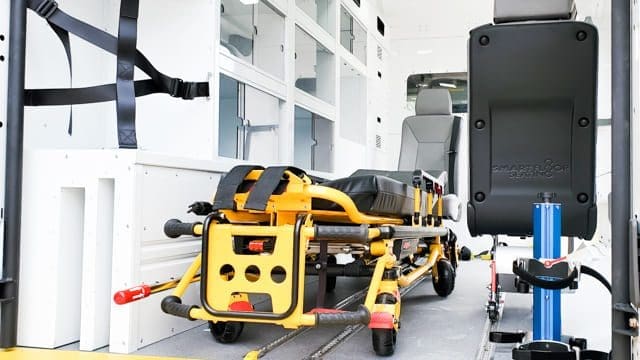
You dove into this article to understand more about stretcher transportation. We hope this information has given you some insight that you can use to make your next decisions.
Wondering where to go next? If you’re curious to learn more about AVAN Mobility’s Mobile Stretcher Transport Van, click the button at the end of this article to talk to a commercial mobility expert. They’ll help you uncover the innovation that’s shaping the future of reliable and respectful medical transportation and help you learn more about the world of stretcher transport solutions.
If you’re not ready to talk to an expert yet, we have some other articles you might also like. Our article on how to apply for grants will help steer your organization in the direction of securing funding.
You should also take a skim through our article on the Mobile Response Unit vs. Ambulance. You’ll learn about the differences between these 2 vehicles.
